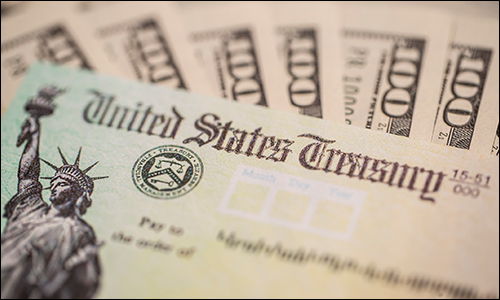Lieff Cabraser partner Kelly Dermody talks to The Intercept about the ongoing obstacles inmates face trying to secure Covid stimulus payments
Over 1.4 million incarcerated Americans won economic relief late last year after CARES Act stimulus checks for inmates (which had been denied by the Trump administration despite congressional approval) were granted following a federal lawsuit brought by Lieff Cabraser and the Equal Justice Society. As The Intercept reports, however, for many inmates in prisons across the U.S., the process of obtaining these checks continues to be fraught with difficulties.
The first was sheer disbelief among incarcerated Americans that they could truly be getting these benefits. “One of the first challenges we faced in the case … was to overcome the perception on the outside, from both provider groups, families, etc., that this couldn’t possibly be true, that it was a scam, that there weren’t these lawyers who had a case that made it possible [for them to actually get CARES Act benefits],” explained Lieff Cabraser partner Kelly Dermody, whose firm worked with the Equal Justice Society to bring forward the lawsuit on behalf of the 1.4 million people incarcerated in U.S. prisons who had unjustly been denied their rightful payments.
“There was a huge amount of public education that happened by a whole ton of people around the country to overcome the absolute conviction that the system would never work for people inside,” Dermody added.
After the class-action lawsuit forced the agency’s hand and the IRS resumed distribution of the payments, inmates have faced widespread and systemic processing delays, and many who were lucky enough to receive payments have found that prison systems have heavily garnished their checks. In addition, the IRS placed an unnecessary burden on inmates by imposing a deadline, later extended by the court, that gave inmates only six weeks to receive, complete, and file the tax forms needed to obtain the payments.
“Our inference is the IRS just didn’t get to the paper claims that were filed certainly after the October 15 postmark, but possibly even to claims that were filed before that date,” said Dermody. “We’ve heard from just tons of people who are in a state of panic because their cellmate got paid [but] they didn’t.”
The issue is one of the federal government’s own making, however, due to the deadline “arbitrarily imposed” by the IRS. “It’s been very upsetting to see our government leading the charge on that cruelty,” Dermody added.
Read the full piece on The Intercept.
About Kelly M. Dermody
The Chair of Lieff Cabraser’s employment practice group and Managing Partner of Lieff Cabraser’s San Francisco office, Kelly M. Dermody specializes in class and collective actions on behalf of plaintiffs in civil rights, employment, and consumer cases, including gender discrimination cases against Google and Goldman Sachs. Additional case work includes wage suppression claims against technology, healthcare, and academic institutions; overtime and lost pay lawsuits for low-wage workers, I/T professionals, and foreign nationals working for American corporations; and ERISA claims that she has tried on behalf of employees and retirees for pension plan abuses. In 2020, Kelly led the team that successfully challenged the Trump Administration’s improper withholding of CARES Act stimulus funds from incarcerated Americans, leading to the release and distribution of $1.5 billion in stimulus funds, in what may be the single largest recovery for a targeted class from a single lawsuit in history.
Contact us
Use the form below to contact a lawyer at Lieff Cabraser.














